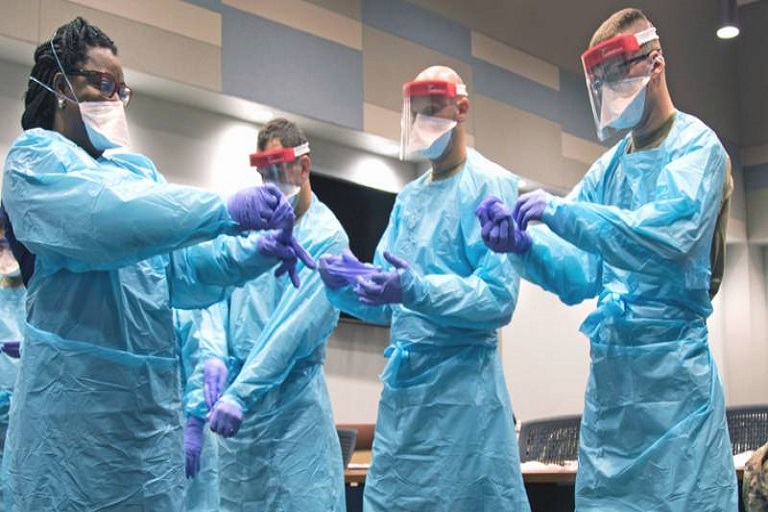The challenges of COVID-19 from a nursing perspective, along with learnings for any future pandemics, were addressed during a recent webinar ‘From the Frontlines; European Nurses facing COVID-19‘ The discussion highlighted the value of digital technology, while nurses from Denmark, Spain and the UK also discussed the importance of community collaboration. The webinar, organised by the HIMSS Nursing Informatics Community, was chaired by Mette Maria Skjoeth from Odense University Hospital, Denmark, featured registered nurse experts Ann Gregory, clinical nurse advisor to NHSX in the UK and Luis Encinas, emergency coordinator, Médecins Sans Frontières, Spain.
Similarities in cross-border community challenges
A recent WHO report highlighted the essential role of nurses in a crisis such as COVID-19; “nurses have played a pivotal role as part of teams managing epidemics that threaten health across the globe”. There is recognition of the manner in which frontline nursing staff have responded with dedication and compassion, risking their lives and mental health in the face of obvious challenges common across health systems. With the current COVID-19 cases in the UK and Spain, sharing best practice and learning from other countries was a major focus of the webinar.
The key takeaways included:
- Focus on collaboration and support amongst nurses to prepare and support the frontline pandemic response in both acute and primary sectors.
- Systemic issues of the nursing shortage, critical care capacity and Personal Protective Equipment (PPE) were common across countries.
- Focus on the benefits of digital technology for nurses and patients, with continuity of care ensured through remote consultations.
- Issue of interoperability, communication and collaboration within countries, and across Europe.
- Patients have embraced the shift to digital, with nurses supporting digital engagement.
Lack of testing adds to pressure
A number of issues added to the pressures and included a lack of critical care capacity – ICU beds per 100,000 in the UK (6.6) are lower than Spain (9.7) which is three times lower than Germany (29.2). Furthermore, an existing shortage of nursing staff was a major challenge in the UK, with a pre-pandemic gap of 40,000 noted by Anne Gregory, leading to a nationwide call for retired/inactive nurses to return. An impressive 7,500 nurses responded, and completed rapid training to bring the cohort up to date.
There were significant issues in Spain, with a lack of foresight, inadequate PPE and testing, placing patients and nurses at risk. More than 35,000 health workers have been infected (of which 60% were nurses), particularly in the elderly care home sector. This was echoed by Gregory who noted that many nurses in the UK were self-isolating due to a lack of testing, putting further strain on the already stretched frontline.
Digital is gaining momentum
Digital technology has been an important theme pointed out by Gregory and Encinas. In the UK “remote care and telemedicine had to rapidly jumpstart, and many nurses with little experience of telehealth have had to adapt and learn quickly in the last month,” Gregory said and added that the long-term digital agenda had suddenly been implemented due to investment and urgent need.
“We have seen primary care nurses taking an important role in remote monitoring of chronic diseases, as their long-term relationship with their patient means they easily identify those who need support, reducing the spread of COVID-19 infection” noted Gregory. Encinas agreed with the increased focus on digital support in Spain, “here we have seen impressive spontaneous innovation for the management of chronic disease with telemedicine; and with lots of creativity.” He also highlighted the issue of interoperability due to Spain’s system of 17 autonomous regions – in contrast to the UK with its more centralised system enabling easier sharing of data and protocols.
“I have heard from some practices who have bought laptops for their nurses, while others have not supported nurses with obtaining or using IT”. One solution in the UK was the creation of The Digital Nurse Network. “It has been in place for over 12 months now, but since COVID-19 we have seen an increase in membership and interest in the digital agenda” said Gregory.
Likewise in Spain, communication and training posed problems; a digital platform created by MSF allowed elderly care home staff to access real-time training, webinars, procedures and a forum. Elderly residences in Spain have suffered considerable mortality, potentially due to a lack of coordination and communication to carers on PPE and protocols, commented Encinas.
Patients embrace the digital shift
Nurses are naturally well-positioned to assess how patients have coped with this rapid change to digital, and the outlook is positive, as “the majority of patients have adapted quickly and appreciate this move to digital,” said Gregory. In the UK, for example, one practice of 8,000 patients, of whom 40% needed a translator, saw more patients go online in the first half of April than during the whole of 2019. One user-friendly solution co-designed by nurses included multilingual patient education videos on social media. “It takes time and imagination to find accessible solutions to engage patients digitally,” she continued.
Patients in Spain have relied heavily on digital communication, assisted by nurses. “The use of video was essential for patients to see their relatives, and also for elderly care home residents who are isolated for their safety”. Encinas also highlighted the worrying issue of mental health: “Especially here in Spain where families are so close, we were concerned at the strict isolation of citizens from their families – digital communication has been of huge benefit”.
A crucial year to raise the profile of nurses
The discussion closed with a message of hope from all parties; it is now crucial to focus on nurses’ role, especially within the context of 2020 being ‘The Year of the Nurse and Midwife’. Gregory concluded: “We must work together to unite, collaborate and support each other globally; we are all in this together. This opportunity to share across borders and hear from other countries is something we should build on and really appreciate.”






























